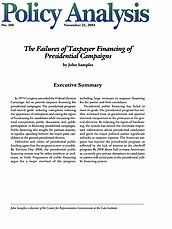Defenders and critics of presidential public funding agree that the program is now in trouble. By Election Day 2008, the presidential public financing system may be either insolvent or irrelevant, or both. Proponents of public financing argue for a major overhaul of the program, including large increases in taxpayer financing for the parties and their candidates.
Presidential public financing has failed to meet its goals. The presidential program has neither increased trust in government nor spurred electoral competition in the primaries or the general elections. By reducing the rigors of fundraising, the system has denied the electorate important information about presidential candidates and given the major political parties significant subsides at taxpayer expense. The American taxpayer has rejected the presidential program, as reflected by the lack of interest in the checkoff program. By 2008 about half as many Americans as currently give private donations to candidates or parties will participate in the presidential public financing system.


